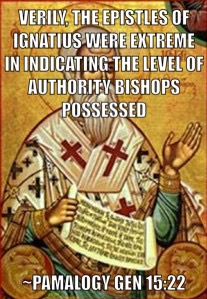GENESIS
XV
questioning authority
1And it came to pass that Christianity broke off into groups over time, first over disputes about heresy and subsequently over leadership. 2And the bishops of Rome came to hold that a special assignment of authority belonged to them above other bishops and that they alone could rightly guard and further define the body of teaching that the church possessed from the time of Jesus, starting with the earliest writings and continuing to their own day. 3And they called this body of teaching and their unique ability to interpret it, the Magisterium.

4And the Magisterium they divided into ordinary and solemn. 5And the solemn they claimed was infallible. 6But despite these later clarifications, the question of authority was unclear. 7For the bishops of Rome believed, possibly only through the speculation of Hegesippus, that Peter, the leader of the twelve apostles of Jesus had transferred his own role of leadership to those he ordained and that there should be an unbroken chain of such authority in what they called the seat of Peter.
Peter and James in Antioch
8And before Peter was in Rome, if he was, there was more certainty in the Christian records that he was in Antioch. 9For Paul attested to this in his letter to the Galatians, which was one of the earliest Christian writings preserved.
10And other early writings such as that by Luke, a companion of Paul and by Africanus, a chronicler, indicated that a certain James, reputed to be the brother of Jesus, served as bishop in Jerusalem while Antioch became a launching point for Christian missionaries. 11And this was so even after James was martyred and Jerusalem was destroyed and the surviving Christians there took refuge in Pellum.
Petrine lineage in Antioch
12And a certain fourth century Christian historian, a Greek speaking bishop of Caesarea named Eusebius, also testified concerning James and claimed that Peter ordained Euodius as bishop of Antioch. 13And Euodius, he believed, was martyred under Nero in 66CE. 14And according to his account the same disciple of Jesus, John, then ordained Ignatius as bishop of Antioch to succeed Euodius as he had ordained Polycarp as bishop of Smyrna.
15And Eusebius also wrote concerning seven letters written by Ignatius. 16And almost a century prior to that two of these were quoted by a presbyter also in Caesarea named Origen. 17And the epistles quoted by Origen were that of Ignatius to the Ephesians and that to the Romans.
18And the transcriptions of the Ignatian epistles survived in longer and shorter versions. 19And some controversy existed about which came first or whether they were recorded by two unequally skilled transcribers at the same time. 20And there were later some who held that all of the Ignatian letters were really forgeries. 21And Callistus was thought a probable suspect.
authority according to Ignatius
22Verily, the epistles of Ignatius were extreme in indicating the level of authority bishops possessed. 23Therefore, forging such a thing would have served a man of low character such as Callistus as described by Hippolytus. 24For they each exhorted Christians in every city to which they were written to obey their bishop as Christ and to do nothing apart from them.
25And the record of the bishops according to Ignatius were these. 26To the Ephesians he exhorted unity with and submission to Onesimus as to Christ and God. 27To the Magnesians with Damas. 28To the Trallians with Polybius. 29To the Smyrneans with an unnamed bishop, which it can be discerned was Polycarp from a separate epistle addressed to Polycarp. 30To the Philadelphians similarly with an unnamed bishop. 31And in each of these letters he urged the churches to obey their bishops as Christ, doing nothing apart from them. 32And there were other epistles also attributed to Ignatius that were not mentioned by Eusebius so they were considered spurious.
some things doubted but others certain
33And Polycarp also mentioned the journey of Ignatius and his martyrdom in a letter he wrote to the Philadelphians which also survives to this day. 34And while there were many controversies in the centuries that followed concerning how to reconcile all these texts, there was little question that Ignatius was bishop in Antioch watching over the progress of Christianity in Syria and that the lineage of succession of bishops in Antioch was traceable to Peter.
lack of support from Ignatius
35And it came about that large groups of Christians, later disagreeing on various points of doctrine, found the exceptional authority claimed by Rome to be invalid. 36And the epistles of Ignatius were early evidence of this. 37For while they each and every one urged obedience to bishops as to Christ and to God, none called for unity to the bishop of Rome specifically. 38Apparently not even Callistus thought of that. 39But betraying the interests of Callistus most of all was the fact that the only epistle in which such submission to the bishop was not mentioned was that to the Romans. 40Neither did Ignatius mention any bishop of Rome by name.
42And there were two different renderings extant of each of the Ignatian epistles. 43And both versions of his epistle to the Romans, both the longer and the shorter, merely stated that Ignatius did not believe he was worthy of martyrdom as Peter and Paul had been. 44Many therefore concluded that there was no succession of bishops in Rome. 45But those loyal to what came to be called the Roman Catholic Church supposed the identity of certain bishops needed to be hidden, lest they be arrested as Ignatius was. 46And they supposed that was why Justin had also said there were no Christians in Rome besides those in his own apartment dwelling.
other factors
47And there were many other facts to consider in order to discern whether the bishops of Rome really possessed such a level of ecclesiastical power as there was much written about Peter and about the keys given to Peter and the apostles by Christ according to the account given by Matthew, on which Christ would build his church. 48And in addition to the epistle written by Clement mentioned by Ireneus which survives to this day, there also survives other works attributed him. 49And the work of the Clementines, as they were called, were considered to be a romanticized version of the stories about the early church, with perhaps not that much of a habit of verifying any facts. 50And they told, among other things, of the struggles between Peter and a certain heretic named Simon, concerning which the gradual development of the story revealed much about early Christian thought on authority.
<< PGen Ch14<< || PGen Index|| >>PGen Ch16>>
